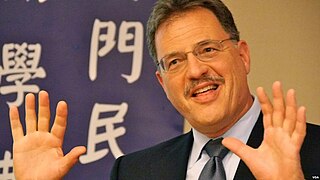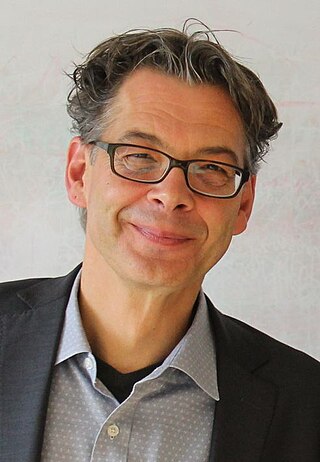New institutionalism is an approach to the study of institutions that focuses on the constraining and enabling effects of formal and informal rules on the behavior of individuals and groups. New institutionalism traditionally encompasses three major strands: sociological institutionalism, rational choice institutionalism, and historical institutionalism. New institutionalism originated in work by sociologist John Meyer published in 1977.
Michael Mann FBA is a British-born emeritus professor of sociology at the University of California, Los Angeles (UCLA) and at the University of Cambridge. Mann holds dual British and United States citizenships.
In sociology, an isomorphism is a similarity of the processes or structure of one organization to those of another, be it the result of imitation or independent development under similar constraints. The concept of institutional isomorphism was primarily developed by Paul DiMaggio and Walter Powell. The concept appears in their 1983 paper The iron cage revisited: institutional isomorphism and collective rationality in organizational fields. The term is borrowed from the mathematical concept of isomorphism.

Larry Jay Diamond is an American political sociologist and leading contemporary scholar in the field of democracy studies. Diamond is a senior fellow at the Freeman Spogli Institute for International Studies, Stanford University's main center for research on international issues. At the Institute Diamond served as the director of the Center on Democracy, Development, and the Rule of Law from 2009-2016. He was succeeded in that role by Francis Fukuyama and then Kathryn Stoner.

Stephen David Krasner is an American academic and former diplomat. Krasner has been a professor of international relations at Stanford University since 1981, and served as the Director of Policy Planning from 2005 to April 2007 while on leave from Stanford.

The Tunisian General Labour Union is a national trade union center in Tunisia. It has a membership of more than one million and was founded January 20, 1946.

William Richard Scott is an American sociologist, and Emeritus Professor at Stanford University, specialised in institutional theory and organisation science. He is known for his research on the relation between organizations and their institutional environments.
Stanford University has many centers and institutes dedicated to the study of various specific topics. These centers and institutes may be within a department, within a school but across departments, an independent laboratory, institute or center reporting directly to the dean of research and outside any school, or semi-independent of the university itself.
Sociological institutionalism is a form of new institutionalism that concerns "the way in which institutions create meaning for individuals." Its explanations are constructivist in nature. According to Ronald L. Jepperson and John W. Meyer, Sociological institutionalism
treats the “actorhood” of modern individuals and organizations as itself constructed out of cultural materials – and treats contemporary institutional systems as working principally by creating and legitimating agentic actors with appropriate perspectives, motives, and agendas. The scholars who have developed this perspective have been less inclined to emphasize actors’ use of institutions and more inclined to envision institutional forces as producing and using actors. By focusing on the evolving construction and reconstruction of the actors of modern society, institutionalists can better explain the dramatic social changes of the contemporary period – why these changes cut across social contexts and functional settings, and why they often become worldwide in character.
The Ford Dorsey Master's in International Policy (MIP) at Stanford University is a two-year graduate program granting the Master of Arts degree. Housed within Stanford's Freeman Spogli Institute for International Studies, MIP is a multidisciplinary program dedicated to the study and analysis of international affairs. The current director of MIP is Francis Fukuyama, also the Olivier Nomellini Senior Fellow at the Freeman Spogli Institute for International Studies. Dr. Chonira Aturupane is the associate director of academic and student affairs.
David G. Victor is a professor of innovation and public policy at the School of Global Policy and Strategy at UC San Diego, where he holds the Center for Global Transformation Endowed Chair in Innovation and Public Policy.
Drew Linzer is an American political scientist who serves as the director and chief scientist at Civiqs. He was formerly an assistant professor of political science at Emory University. He is known for his psephology site "Votamatic". In 2014, Linzer ran the successful Daily Kos election forecast.
World polity theory is an analytical framework for interpreting global relations, structures, and practices. The theory views the world system as a social system with a cultural framework called world polity, which encompasses and influences the actors under it. According to the theory, world polity provides a set of cultural norms and directions that actors of the world society follow in dealing with problems and general procedures.
Shadi Hamid is an American author and a senior fellow at the Brookings Institution. He is also a contributing writer at The Atlantic as well as research professor of Islamic studies at Fuller Seminary. This appointment is the first time a Muslim scholar has been hired in the school's history. He has been called a "prominent thinker on religion and politics" in the New York Times and was named as one of "The world's top 50 thinkers" in 2019 by Prospect Magazine. He is known for coining the phrase "Islamic exceptionalism" to describe Islam's resistance to secularization and outsized role in public life, but it has come under some criticism.
Albert James Bergesen is an American sociologist and Professor and Head of the Department of Sociology at University of Arizona. He is also a Professor of Government and Public Policy, and Professor of Sociology in the McGuire Center for Entrepreneurship, at the Eller College of Management. He has published three books, edited five anthologies, authored hundreds of articles, and is cited in numerous fields, such as collective violence, international relations, world-systems analysis, environmental sociology, cultural sociology and organizational sociology.
The Next Revolution was a television program that debuted on the Fox News Channel, being broadcast on the channel from June 4, 2017–May 28, 2023. The hour-long weekly program was hosted by Steve Hilton, who served as a political adviser to former British prime minister David Cameron. The program focused on providing opinion commentary about the right-wing populist movement.
Andrea Dew Steele is an American activist who co-founded Emerge California in 2002, and founded Emerge America in 2005 which now has affiliates in 27 different states of the U.S., with the goal of having an affiliate in all 50 states by 2020. The goal of Emerge affiliates is to increase the number of Democratic women in all areas of the government. Steele spent her career in Democratic activism and has been a director at Human Rights Watch. She is also a regular contributor to the Huffington Post.
Rosamond (Roz) Lee Naylor is an American economist focused on global food security and sustainable agriculture. She is the William Wrigley Professor of the Stanford University School of Earth System Science, and the founding Director of the Center on Food Security and the Environment at Stanford University. Her academic career has centered on environmental science and policy related to global food systems and food security. She is the President of the Board of Directors of the Aspen Global Change Institute, a Fellow of the Ecological Society of America, and a member of the Forest Protection Advisory Panel for Cargill.
Martin Carnoy is an American labour economist and Vida Jacks Professor of Education at the Stanford Graduate School of Education. He is an elected member of the National Academy of Education as well as of the International Academy of Education. Professor Carnoy has graduated nearly 100 PhD students, a record at Stanford University.

Georg Krücken is a German sociologist and higher education researcher. He is director of the International Center for Higher Education Research Kassel (INCHER-Kassel) at the University of Kassel.




